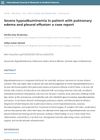 May 2024 in “Pigment International”
May 2024 in “Pigment International” Several treatments are effective for pigmentary disorders like vitiligo and melasma.
[object Object] March 2023 in “Authorea (Authorea)” Early diagnosis and treatment of systemic-onset juvenile idiopathic arthritis are crucial for improvement.
 February 2023 in “Journal of Ginseng Research/Journal of ginseng research”
February 2023 in “Journal of Ginseng Research/Journal of ginseng research” New ginseng compounds may help treat degenerative diseases.
 September 2021 in “VNU Journal of Science: Medical and Pharmaceutical Sciences”
September 2021 in “VNU Journal of Science: Medical and Pharmaceutical Sciences” Platelet-rich plasma, which has growth factors, is used in many medical fields and can promote tissue repair, stimulate hair growth, and increase hair density.
June 2013 in “International Journal of Dermatology” Central lipohypertrophy in HIV-infected women may lead to shorter eyelashes.
January 2025 in “Anais Brasileiros de Dermatologia” Male pattern baldness worsens with age and can be treated with medications like minoxidil and finasteride, but side effects and personalized care are important.
Current hair regeneration methods show promise but face challenges in maintaining cell effectiveness and creating the right environment for hair growth.
 November 2024 in “International Journal of Research in Medical Sciences”
November 2024 in “International Journal of Research in Medical Sciences” Hypoalbuminemia can cause pleural effusion and needs careful treatment.
 November 2024 in “Frontiers in Medicine”
November 2024 in “Frontiers in Medicine” Cirrhosis affects quality of life with various symptoms, requiring a holistic, multidisciplinary approach for management.
 October 2024 in “Dermatologic Surgery”
October 2024 in “Dermatologic Surgery” PRP and PRF show promise for hair growth but need more research for consistent and safe use.
 October 2024 in “Aesthetic Plastic Surgery”
October 2024 in “Aesthetic Plastic Surgery” Micrografts are a safe and effective treatment for hair loss in both men and women.
 October 2024 in “Skin Appendage Disorders”
October 2024 in “Skin Appendage Disorders” PRP is popular for hair restoration but needs better research methods to confirm its effectiveness and safety.
 September 2024 in “International Journal of Molecular Sciences”
September 2024 in “International Journal of Molecular Sciences” High doses of testosterone disrupt hormone levels and receptor expression in the uterus, affecting fertility.
 September 2024 in “Current Oncology”
September 2024 in “Current Oncology” Docetaxel often causes hair loss, with limited effective treatments and no cure for permanent hair loss.
 August 2024 in “Stem Cell Research & Therapy”
August 2024 in “Stem Cell Research & Therapy” New regenerative therapies show promise for treating hair loss.
 August 2024 in “Quality in Sport”
August 2024 in “Quality in Sport” New treatments for common hair loss are needed.
May 2024 in “International Journal of Molecular Sciences” Mouse hair follicle stem cells can help prevent Type 1 Diabetes.

Combining PRP with Tressfix Serum is more effective for hair regrowth in telogen effluvium than using either alone.
 April 2024 in “Archiv EuroMedica”
April 2024 in “Archiv EuroMedica” Platelet-Rich Plasma therapy helps increase hair density and regrowth for some types of hair loss.
Aesthetic rehabilitation techniques can improve life quality and wellbeing for disabled patients.
 February 2024 in “International Journal of Molecular Sciences”
February 2024 in “International Journal of Molecular Sciences” Hair loss in Androgenetic Alopecia is caused by genetics, aging, and lifestyle, leading to hair follicle shrinkage and related health risks.
January 2024 in “Diagnostics” Long COVID causes a wide range of long-lasting symptoms that change over time and are hard to diagnose and treat.
January 2024 in “Biomedicines” The review shows that skin symptoms like chronic fungal infections, hair loss, and skin depigmentation are key for early detection and management of APECED.

Arabica coffee pulp extract may help prevent hair loss and promote hair growth.

Nanocarriers with plant extracts show promise for safe and effective hair growth treatment.
 September 2023 in “International Journal of Trichology”
September 2023 in “International Journal of Trichology” Adipose-derived stem cells may help with hair loss, but more research is needed.
 August 2023 in “Aesthetic Plastic Surgery”
August 2023 in “Aesthetic Plastic Surgery” Platelet-rich plasma therapy helps increase hair density in male patients with hair loss but doesn't change hair thickness.
 August 2023 in “Tzu Chi Medical Journal”
August 2023 in “Tzu Chi Medical Journal” Iron deficiency is the main cause of hair loss in women, and iron supplements started within 6 months can improve hair health.
August 2023 in “Stem cell reviews and reports” [object Object]  July 2023 in “Biodiversitas”
July 2023 in “Biodiversitas” Sundanese mothers in a rural village in West Java use plants for maternal care.





















